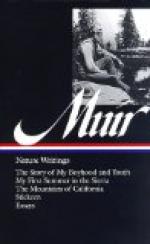of sticking-plaster of wondrous adhesiveness, prowled
at night about the country lanes and even the town
streets, watching for children to choke and sell.
The Dandy Doctor’s business method, as the servants
explained it, was with lightning quickness to clap
a sticking-plaster on the face of a scholar, covering
mouth and nose, preventing breathing or crying for
help, then pop us under his long black cloak and carry
us to Edinburgh to be sold and sliced into small pieces
for folk to learn how we were made. We always
mentioned the name “Dandy Doctor” in a
fearful whisper, and never dared venture out of doors
after dark. In the short winter days it got dark
before school closed, and in cloudy weather we sometimes
had difficulty in finding our way home unless a servant
with a lantern was sent for us; but during the Dandy
Doctor period the school was closed earlier, for if
detained until the usual hour the teacher could not
get us to leave the schoolroom. We would rather
stay all night supperless than dare the mysterious
doctors supposed to be lying in wait for us.
We had to go up a hill called the Davel Brae that
lay between the schoolhouse and the main street.
One evening just before dark, as we were running up
the hill, one of the boys shouted, “A Dandy
Doctor! A Dandy Doctor!” and we all fled
pellmell back into the schoolhouse to the astonishment
of Mungo Siddons, the teacher. I can remember
to this day the amused look on the good dominie’s
face as he stared and tried to guess what had got
into us, until one of the older boys breathlessly
explained that there was an awful big Dandy Doctor
on the Brae and we couldna gang hame. Others corroborated
the dreadful news. “Yes! We saw him,
plain as onything, with his lang black cloak to hide
us in, and some of us thought we saw a sticken-plaister
ready in his hand.” We were in such a state
of fear and trembling that the teacher saw he wasn’t
going to get rid of us without going himself as leader.
He went only a short distance, however, and turned
us over to the care of the two biggest scholars, who
led us to the top of the Brae and then left us to scurry
home and dash into the door like pursued squirrels
diving into their holes.
Just before school skaled (closed), we all arose and
sang the fine hymn “Lord, dismiss us with Thy
blessing.” In the spring when the swallows
were coming back from their winter homes we sang—
“Welcome, welcome, little
stranger,
Welcome from a foreign shore;
Safe escaped from many a danger
...”
and while singing we all swayed in rhythm with the
music. “The Cuckoo,” that always
told his name in the spring of the year, was another
favorite song, and when there was nothing in particular
to call to mind any special bird or animal, the songs
we sang were widely varied, such as
“The whale, the whale
is the beast for me,
Plunging along through the
deep, deep sea.”
But the best of all was “Lord, dismiss us with
Thy blessing,” though at that time the most
significant part I fear was the first three words.




